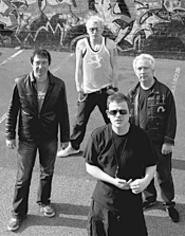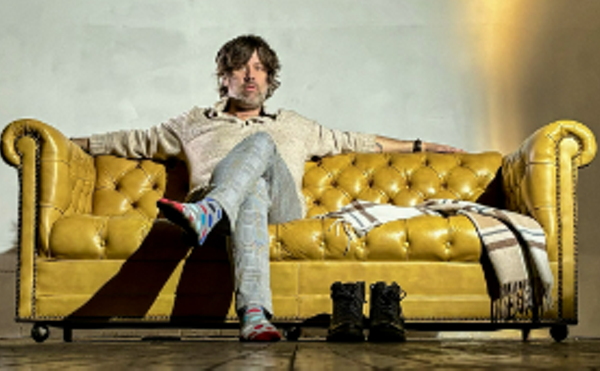
There's history, and then there's what people remember -- and usually, they don't have much in common. Childhood memories often don't match up with home-movie versions of the same events: The sets change, the wrong characters say the right words, the plot twists unexpectedly. It's unfortunate, but it happens. Hard facts soften with age, sharp images blur with time, names on the tip of the tongue move to the back of the mind.
An example: People still readily remember the Sex Pistols and the Clash, "Anarchy in the U.K." and "White Riot," Paul Simonon smashing his bass on the cover of London Calling and Johnny Rotten asking a Winterland audience, "Ever get the feeling you've been cheated?" Of course they do. For those of a certain age and a certain inclination, it's practically stamped on their DNA.
Here's where recall and reality diverge: The punk-rock revolution wasn't set in motion by these two bands alone. There was a third, lesser known act, whose legacy is just as crucial to the development of punk. Check the history books -- George Gimarc's Punk Diary: 1970-1979, say, or Jon Savage's England's Dreaming. A slightly altered set of facts exists in those pages, an expanded version of the truth, a new column of figures that add up to a different sum -- and a few characters to add to the rogues' gallery: a band from Manchester called the Buzzcocks.
See, when the Sex Pistols and the Clash were giving rock music a facelift in the late 1970s, the Buzzcocks were standing right next to them during the entire operation, wielding a scalpel, making their mark. The group held its own and then some: Singles Going Steady, 1979's collection of would-be hits, is a masterpiece that equals Never Mind the Bollocks . . . and London Calling, 47 minutes that are all balls and strikes. They weren't as notorious as the Sex Pistols, nor as ambitious as the Clash, but they were every bit as volatile, splintering apart after only a few years.
"The first one was a big rush, really," singer-guitarist Pete Shelley says. "We did so much in such a short time, from initial conception to splitting in 1981. That was just five years, all told. But, really, we did quite a lot in those five years."
And yet, no one remembers a rock-and-roll swindle that was much greater than anything Sex Pistols manager Malcolm McLaren ever concocted. The Pistols burned out, and the Clash faded away (which is the gentlest possible description of 1985's Cut the Crap). The Buzzcocks split the difference, sort of, breaking up in 1981 and re-forming eight years later with a new rhythm section (bassist Tony Barber and drummer Phil Barker) and a handful of albums (including this year's Buzzcocks) that did nothing to detract from their reputation. (And "Totally From the Heart," the first song on 1996's All Set, may even have added to it.) But though he's one of the few people who could answer yes to Rotten's infamous question, Shelley doesn't mind that the Buzzcocks don't get the credit they deserve.
"Well, I think Steve probably thinks that more than I do," Shelley says with a laugh, referring to his fellow singer-guitarist Steve Diggle, the only other original member in the band. "I tend to think, well, one day everyone will realize." He laughs again. "And I think that things are changing, so people are starting to take notice."
Maybe the band's current stint on Pearl Jam's summer tour will force a few more people to pay attention. (The Buzzcocks are also playing dates of their own on off-days of the tour, including Peabody's on Friday.) Or maybe a kid will pick up a Simple Plan record and do a little research, connecting the dots from the Canadian punk-pop group to Blink-182 to Green Day to the Buzzcocks, following the timeline back to the beginning with an iPod and a few trips to Kazaa. That scenario is a little more unlikely, but you never know.
After all, that kid has been surrounded by the Buzzcocks his entire life, an entire generation of bands (feel free to add the Ataris, Alkaline Trio, and a host of others to the above list) that should be kicking in a few bucks to Shelley and Diggle's 401(k). He just doesn't know it, doesn't see that the punk revival's dress code may belong to the Sex Pistols and the Clash, but the Buzzcocks own the sound -- pop that snaps and crackles, punk that's more interested in tearing apart songs, rather than governments.
That sound -- which debuted on the group's self-financed "Spiral Scratch" EP in 1977, before singer Howard Devoto left to form Magazine -- shows up again on Buzzcocks, released March 18 on Merge Records. The strongest effort from the Buzzcocks since Shelley and Diggle got the band back together in 1989, this disc plays by the same loud-fast rules as 1978's Another Music in a Different Kitchen and Love Bites, but does so through adult eyes. "Life's full of disappointments," Shelley sings on "Useless." "Wonder where the good times went/Craving for recognition rather than accomplishment." (So maybe Shelley's not quite so content with how he and his band have been remembered.)
Devoto turns up on Buzzcocks as well, co-writing a pair of songs with Shelley. The former first appeared on Buzzkunst, last year's collaboration by the duo under the name ShelleyDevoto.
"People always have this idea that he's very serious, very studied, and intellectual," Shelley says. "Which, I suppose, he can be. But, really, he's got a great sense of humor. We just laughed through the sessions. It's a wonder we managed to get anything done."
The same could be said for the Buzzcocks sessions. Or lack thereof. Diggle was sidelined for a year, after he took a spill on a rented scooter while on vacation in Greece with his girlfriend, requiring a metal plate to fix his mangled wrist. The guitarist's injury was the latest hurdle thrown in the band's path since its rebirth almost 15 years ago, joining the ongoing label difficulties and general indifference that have slowed the group's progress.
"This year will be the 14th anniversary of the reunion," Shelley explains. "So it's taken us almost three times as long to do just as much [as we did before]." He laughs. "So it's a little more leisurely, but I'm not sure whether or not I'm quite happy with it being that leisurely."
He's got a point. Time isn't as free as it once was, as Shelley and Diggle get older, when every album could be the band's last. Which brings up a sad thought: If Buzzcocks is the group's last gasp, if they break up in a week or a month or even a year, will they be remembered?
Maybe there's still time to make sure.











